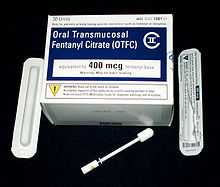Actiq

Actiq by Cephalon is a solid formulation of fentanyl citrate on a plastic stick that dissolves slowly in the mouth for absorption across the buccal mucosa. Generically Actiq is a form of oral transmucosal fentanyl citrate (OTFC). In the UK, fentanyl is a Class A drug under the Misuse of Drugs Act 1971. In the Netherlands, Fentanyl is a List I substance of the Opium Law. In the U.S., fentanyl is a Schedule II controlled substance per the Controlled Substance Act. Other pharmaceutical preparations consisting of fentanyl are Durogesic and Duragesic (72-hour continuous-release fentanyl patches) and Fentora, a rapidly dissolving fentanyl lozenge which, like Actiq, is administered transmucosally over the buccal mucosa. OTFC is absorbed much as nicotine is absorbed when dipping tobacco is placed in one's mouth between the gum and cheek.
An Actiq lozenge contains 2 grams of sugar[1] (8 calories). The status of a sugar-free version, called Actiq-SF, is unclear. Since the release of Fentora—an effervescent buccal fentanyl tablet for breakthrough cancer pain—Cephalon has indefinitely postponed plans to release a sugar free version of Actiq.
Administration
Approximately 100 times more potent than morphine, Actiq is intended for opiate-tolerant individuals and is effective in treating cancer breakthrough pain. However, it is often prescribed for "off-label uses", i.e. not for cancer patients, such as bone injuries, migraines, severe back pain, cluster headaches, neuropathy, arthritis, and other situations of moderate to severe chronic, non-malignant pain.
The Actiq dosage unit is a white, berry-flavored lozenge on a stick which is swabbed on the buccal mucosa, between cheek and gum to release the fentanyl quickly into the bloodstream. It is most effective when the lozenge is consumed in exactly 15 minutes, as the balance of the drug absorbed through the cheeks and the amount swallowed is maintained.
Absorption
Normally 25% of the drug is absorbed via the buccal mucosa directly into the bloodstream while the remaining 75% is swallowed and then slowly absorbed in the gastrointestinal tract. Two-thirds of the swallowed Actiq (or 50% of the total dose) is metabolized by the liver and becomes unavailable for any pain relief function, leaving only around 33% of the ingested fentanyl [25% of the total dose will reach the bloodstream via the intestines, 50% of the total dose will reach the bloodstream via both routes] available for pain relief. This is why the drug is far less potent if consumed orally compared to transmucosally.
Side effects
Side effects typical to other opioids can be expected.[2] Common side effects include sedation, nausea, constipation, tolerance, and respiratory depression.[3]
Actiq has been linked to dental decay, with some users who previously had no dental issues, having had teeth loss and in the U.S many users have started their own Facebook page in educating users to the severe dental issues caused by the so called fentanyl lollipops. CBS News reported the issue 28th September 2009.
Each lozenge contains approx. 2grams of sugar, and has issues for pre-diabetic users and diabetic users.
Recreational use
As with all opioids, there have also been reports of illicit use on the street, where it is (incorrectly) known as "morphine lollipops", and in the US as "perc-a-pop", and sells for between $5–25, depending on its dose.[4] The attorneys-general of Connecticut and Pennsylvania have launched investigations into its diversion from the legitimate pharmaceutical market, including Cephalon's "sales and promotional practices for Provigil, Actiq and Gabitril".[4] In order to curb misuse, many health insurers have begun to require precertification and/or quantity limits for Actiq prescriptions.[5][6][7]
Generic alternatives
Beginning late September, 2006, a generic version of Actiq has been available, made by Barr Pharmaceuticals. Cephalon has begun marketing its own version of generic Actiq to compete in the generic OTFC market. The generic versions of Actiq, simply called "oral transmucosal fentanyl citrate," are packaged just like name brand Actiq, and there is no difference in appearance, active and inactive ingredients, or function as compared to the name brand Actiq.
References
- ↑ Actiq Information from Drugs.com
- ↑ Actiq Side Effects http://www.drugs.com/sfx/actiq-side-effects.html
- ↑ Ramsin Benyamin, MD, Andrea M. Trescot, MD, Sukdeb Datta, MD, Ricardo Buenaventura, MD, Rajive Adlaka, MD, Nalini Sehgal, MD, Scott E. Glaser, MD, and Ricardo Vallejo, MD (2008). "Opioid Complications and Side Effects". American Society of Interventional Pain Physicians (ASIPP). Retrieved December 22, 2010.
- ↑ 4.0 4.1 "Painkiller is topic of inquiry", Bob Mims, The Salt Lake Tribune, 11 November 2004
- ↑ "Aetna notice regarding precertification requirement", Aetna, May, 2007
- ↑ "BlueCross BlueShield of Arizona notice regarding precertification requirement", Blue Cross Blue Shield of Arizona, November 5, 2007
- ↑ "Medications Requiring Precertification", Oxford Health Plans
External links
- Official Actiq website.
- Consent Order Requires Cephalon to Grant Third-Party License to Sell Generic Actiq in U.S.
- Barr Pharmaceuticals (2006-09-27). Barr Launches Generic ACTIQ(R) Cancer Pain Management Product. Press release.
| ||||||||||||||||||||||||||||||||||||||||||||||||||||||||||||||||||||||||||||||||||||||||||||||||||||||